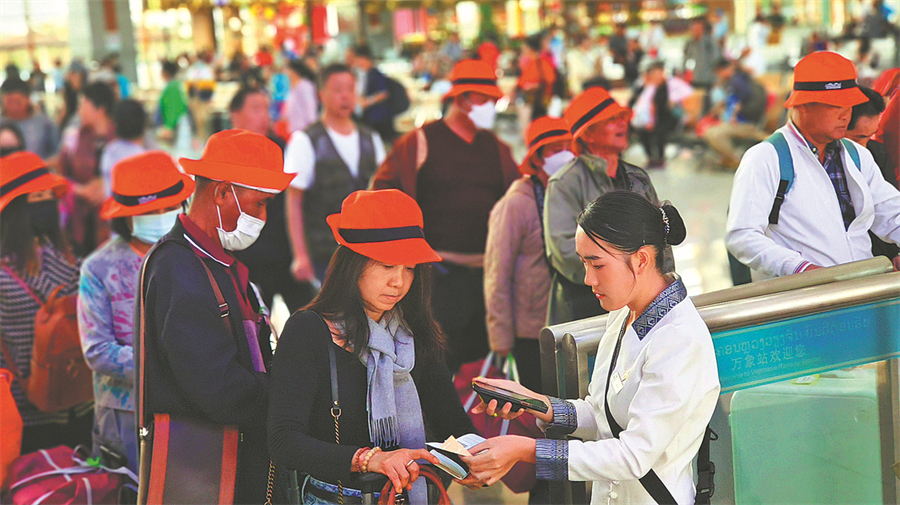China-Laos Railway train adds 50 seats

Members of a tour group from Thailand check in to take the train on the China-Laos Railway in Vientiane, Laos, on Friday. [Yang Yongquan/for China Daily]
Demand for travel between countries spikes as Spring Festival approaches
More seats for international passengers are being offered on the bullet train operating on the China-Laos Railway to meet the strong demand for travel between the two nations as the Spring Festival approaches next month, the line's operator, China Railway Kunming Group, said on Saturday.
Since Friday, the first day of China's Spring Festival travel rush, the train has added 50 seats — for a total of 350 — for cross-border travelers between Kunming, the capital of Southwest China's Yunnan province, and Vientiane, capital of Laos. Round-trip service between Kunming and Vientiane is offered daily once a day.
The train takes about 9 hours and 30 minutes to travel between the two cities, departing Kunming at 8 am and arriving at Vientiane at about 4:30 pm.
China's Spring Festival falls on Feb 10 this year. This year's Spring Festival travel rush started on Friday and will end on March 5. The national railway network expects to see 480 million passenger trips during the 40-day period.
According to the Kunming railway company, there is a strong demand for cross-border travel along the China-Laos Railway during the travel rush. Passengers are advised to make plans in advance.
Vannaphone Khamphilom, a Lao student who studies at Kunming University, took the ride from the Yunnan capital to Vientiane for winter vacation this month.
"The train is always busy," she said, adding that her Chinese friends asked her to buy train tickets for them during Spring Festival.
"There is a surge in demand during the holiday, and the tickets are hard to get," she said.
She said she prefers traveling by train to flying.
"Since (the international train service) opened, I stopped taking the plane. On the train, I can talk to different people, Lao and Chinese," said Khamphilom, who owns a human resources company.
She said such trips are a great opportunity to gather travel information for her mother, who owns a travel company.
This year's Spring Festival travel rush is the first since the China-Laos Railway began offering international passenger service in April last year.
Railway employees along the route are well prepared for the "big test" of the year.
Train conductor Yi Bofeng ensures that arrival cards are issued in Chinese, English and Lao to passengers on the train so they can fill them out before arriving at Mohan, Yunnan, or Boten, Laos, the border cities where passengers must clear immigration and customs.
She helps passengers complete the cards in advance to shorten clearance times and make their trip more efficient.
Although she can speak four languages — Mandarin, English, Lao and the Dai dialect — Yi said she was initially nervous when foreign travelers would ask her for help, but now she is more confident.
"To offer better service to international passengers, we have received tailored training in Lao and English. I also practice my language skills to show my professionalism as a conductor on the international route," she said.
She said she and her colleagues are well prepared to offer high-quality service during the Spring Festival travel rush to more passengers.
The line's international passenger service has experienced a gradual increase in demand since its operation began. This month, the occupancy rate of the international passenger train has already reached 93.1 percent, according to China Railway Kunming Group.
Because of the winter, the warm and pleasant climates in places such as Vientiane and Luang Prabang in Laos, as well as Xishuangbanna Dai autonomous prefecture and Pu'er in Yunnan, has been favored by a large number of tourists from China and Southeast Asian countries.
Many tourists are opting to take the China-Laos Railway to visit these places.
Wang Lijuan, general manager of the Kunming Merry International Travel Service, an international tourism company, said: "Since the opening of the international service, travelers, particularly from northern Thailand, can take the railway to China. In the past, they had to travel to Bangkok to make a transfer before taking the plane to China."
Wang's company mainly works with foreign tourists who want to travel to China.
She also noted that since the adoption of the visa-free policy between China and Thailand, more inquiries are being made about traveling to China by train.
According to China Railway Kunming Group, the international service has so far handled more than 125,000 passenger trips from 75 countries and regions. Most of the passengers hail from China, Laos, Thailand and Singapore.
The 1,035-kilometer China-Laos Railway, a landmark project of the Belt and Road Initiative, began operation in December 2021. It has turned Laos from a landlocked country into a land-linked hub in the Indo-China Peninsula.
























